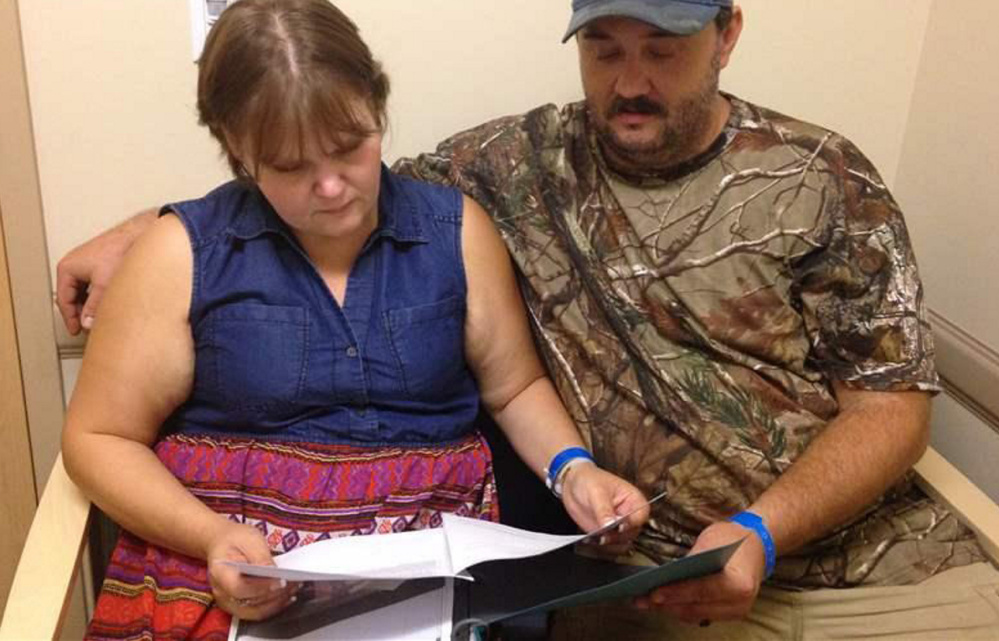HUNTINGTON, W.Va. — This city, where the rate of drug overdose deaths is nearly 10 times the national average, has done more than most to fight the heroin and prescription painkiller epidemic.
Local police have been diverting drug users to specialized drug courts for treatment. The city opened a syringe exchange program to reduce the spread of infectious diseases among drug users. And doctors and nurses from a local hospital have developed a model facility to care for the hundreds of opioid-dependent infants born to heroin-addicted mothers.
But instead of getting better, Huntington’s opioid problem is getting worse.
In just one afternoon last month, 28 people in this city of 50,000 overdosed on heroin. Since January, 773 people have overdosed on opioids (including prescription painkillers and heroin), a 24 percent increase over last year. An estimated 8,000 Huntington residents are addicted, mostly to opioids.
“It’s really an overwhelming situation,” said Dr. James Becker, medical director of West Virginia’s Medicaid program and professor of family medicine at Marshall University in Huntington.
A fragmented treatment system, widespread bias against addiction medications and a shortage of trained workers often thwart those seeking help. Instead, they show up in emergency rooms, or reach out to local doctors, nurses and clergy.
Like other states that have expanded Medicaid under the Affordable Care Act, West Virginia is trying to make it easier for recipients of the federal-state health insurance program for the poor to find and pay for effective addiction treatment.
So far, however, greater availability of Medicaid coverage has not made a dent in the growing need for treatment, local officials say.
MYTHS AND MEDICATIONS
Unlike other drug addictions, opioid and heroin addiction can be treated with one of three medications – methadone, buprenorphine and Vivitrol – that have proven more effective at keeping people from abusing drugs than abstinence and 12-step therapies that don’t include the medications.
But in Huntington, and much of the rest of the country, spiritual-based recovery programs are favored over medications by the general public and even some medical professionals.
“Many people believe that substance abuse is a weakness of personality and that a person needs to get a handle on their disease, and in that sense, they think that relying on a drug that replaces the drug of abuse is somehow a weakness,” Becker said.
“That’s not the view of most people in the medical community,” he said.
Still, Susan Coyer, director of Huntington Comprehensive Treatment Center, a methadone clinic next to a McDonald’s in downtown Huntington, said she has not received a single referral from any medical professionals in the two years she has been running the center.
Approved for addiction treatment in 1964, methadone has proven highly effective at keeping people in recovery from drug abuse. But federal regulations require patients to show up at a clinic every day to take their dose, making it an inconvenient treatment option for many.
Huntington’s highly visible clinic treats nearly a thousand patients every day. Many have been taking the addiction medication for years, sometimes off and on, depending on how long they can afford the $15-a-day fee.
West Virginia is one of the 17 states where Medicaid does not pay for methadone.
OPENING MINDS
Approved in 2002, buprenorphine acts as a replacement for heroin or painkillers, relieving withdrawal symptoms and cravings without the euphoria, similar to methadone.
But unlike methadone, it can be prescribed by doctors in an office setting.
West Virginia has about 300 physicians with a license to prescribe buprenorphine.
But others in West Virginia and elsewhere provide little counseling and fail to adhere to national protocols requiring drug screenings, Becker said.
Huntington officials often point to two residential 12-step programs that don’t offer medications as an example of the kind of addiction treatment they would want for their own family members. Even though most realize recovery programs without medications don’t work for everyone, they would prefer their loved ones beat their addictions without taking them.
Jim Johnson, the Huntington mayor’s director of drug control policy, said the city’s extensive outreach is starting to change some people’s minds about addiction medication, his included. But for many, he said, “the Earth will always be flat.”
“Every one of us has biases about the problem,” Becker said. “But this epidemic is so severe that we have to get over that.”
Send questions/comments to the editors.



Success. Please wait for the page to reload. If the page does not reload within 5 seconds, please refresh the page.
Enter your email and password to access comments.
Hi, to comment on stories you must . This profile is in addition to your subscription and website login.
Already have a commenting profile? .
Invalid username/password.
Please check your email to confirm and complete your registration.
Only subscribers are eligible to post comments. Please subscribe or login first for digital access. Here’s why.
Use the form below to reset your password. When you've submitted your account email, we will send an email with a reset code.